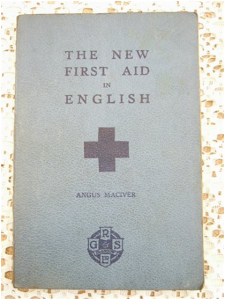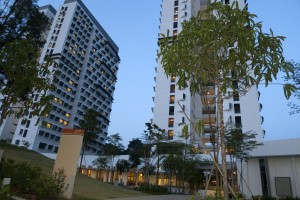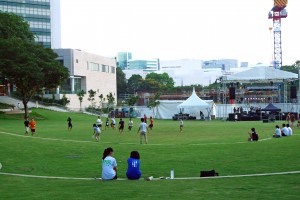English has become the lingua franca of academia, commerce and even diplomacy. Proficiency in the English Language – reading, writing and communications are now critical skills required in all vocations. This is also an area that employers have singled out as a weakness of NUS graduates.
I have been deliberating on whether it is necessary to introduce compulsory language and communications modules in the undergraduate curriculum. We do not want our graduates to be unnecessarily hampered or disadvantaged in the global talent marketplace, because of sub-par reading, writing or speaking skills. Language proficiency will give our graduates an edge in productivity and effectiveness at the workplace.
The undergraduate cohort is a diverse one. To cater to the varying levels of language competence, the Centre for English Language Communication (CELC) is looking into how students can be matched to programs of an appropriate level according to their language ability. Some pilots are already in place.
Our challenge is that students are not keen! Our pilot Writing modules are not attracting much interest from Science, Engineering and Computing students. And students from the Science and Technology disciplines are precisely the ones who are most in need of these courses, as they have far less opportunities to develop language and communications skills through their disciplinary modules.
I sincerely hope students are convinced of the importance of English proficiency. Prof Brent Strong, the Lorin Farr Professor of Entrepreneurial Technology at the Brigham Young University, has written a persuasive piece on ‘Why Engineers Should Read Shakespeare’. He argues the importance for scientists to develop the ability to express themselves articulately in terms that all can understand and to discuss scientific and other issues from a broad and comprehensive viewpoint. He encourages engineers to read Shakespeare, and explains how Shakespeare will help us think, because we think in words.
Of course, we recognize that a single module, or a set of modules, does not suffice to produce sustained results; we must in parallel encourage faculty members to integrate writing and communications components into existing course modules (and for each major). Supporting infrastructure must also be put in place to encourage and assist with writing and communications; these may include seminars, workshops, and writing and communications stations and resource centres amongst others.
I had to realise the importance of, and then learn English the hard way. English did not come naturally to me. I was raised in a dialect-speaking environment. Father had secondary education but in a Chinese-medium school; Mother did not have the opportunity to receive any education. And so, my siblings and I picked up English in school. I managed alright, until secondary school, during which English and Literature became my weakest subjects.
When in Pre-U, I harboured hopes of going abroad for university. I excelled in Math and the Sciences. But alas, it wasn’t good enough. During a PSC (Public Service Commission) scholarship interview conducted in the middle part of Pre-U 2, a panel member remarked that he didn’t think I would be able to pass my GP (General Paper). There went my overseas scholarship.
I felt hurt and indignant. And I was determined to prove to them that I could do well in GP. I was from a poor family and my parents could not afford tuition. So I decided to self-teach. I bought a few assessment books and First Aid in English became my ‘bible’. I read voraciously and disciplined myself to write a GP essay every day. Eventually, I was happy to have managed a P3 at the ‘A’ levels – though not stellar, it was a decent grade.

Language can be likened to music. Music is a medium of expression; one can depict merry and melancholy through music. We have heard and can feel how tenderly an instrument like the violin can render ‘Air on a G String’. But we cannot execute the same, unless we have acquired technical mastery of the instrument. Language is our primary mode of expression and communication. Likewise, without the requisite grounding in grammar, vocabulary, semantics et al, we are not able to express ourselves as richly and fully.
Language acquisition is a lifelong endeavour; I am still at it. Never cease to learn, and never ever give up.


